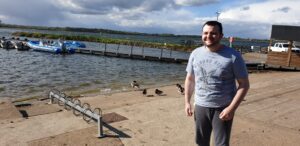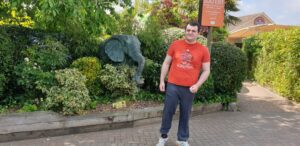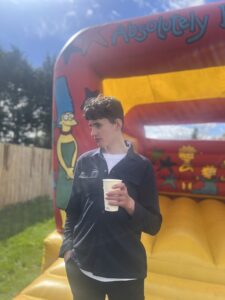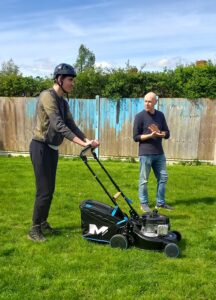For many autistic people, the frustrations of trying to be understood and heard can lead to behaviour that we refer to as challenging. Combine this with other neurodiverse or mental health conditions such as ADHD or social anxiety and there is the potential for the person to struggle with the everyday social demands of life.
Paul and Nick each came to live at the same Achieve together residential home in Essex following admission to hospital for assessment and treatment. At these, their lives had become severely restricted, often with 3-1 support. Getting to know each person, developing trust and a person-centred focus their new support teams have managed to understand them better. Imaginative, sometimes ingenious, solutions have led to an impressive improvement in quality of life for both young men.
Postive behaviour
Achieve together’s Positive Behaviour Support (PBS) Team has been on hand throughout to provide specialist advice and help. Members of the PBS Team work with support teams in homes to create a comprehensive person-centred PBS Plan, based on each person’s needs. The PBS Plan is developed with the person and their circle of support, including the direct support team. It is focused on understanding the functions the distressed behaviour or behaviours of concern serve, including understanding trauma the person has experienced. The team then works together to plan how to enhance the life, coping and communication skills of each person to improve their quality of life.
PBS Support Practitioner, Adelicia Sheard, says: “The whole team at this residential home has an incredibly hands-on and imaginative approach to how they can support Paul and Nick in the best possible ways.”
Home Manager, Lloyd Rose, adds: “We always find consistent creative solutions to communications challenges. There are so many things to be proud of with the progress of both Paul and Nick.”
Clutter-free rooms
Paul was the first person to move into the newly opened home in mid-2021, aged 20. He lives in a self-contained annexe with his own bedroom, living room and bathroom. The initial period saw frequent extensive damage to property, due to his distressed behaviour.
However, led by Lloyd, the team quickly understood that Paul’s behaviour was a result of his strong preference for a clutter-free, low arousal environment. They learned to remove his plate as soon as he finished eating and gradually supported him to take his plate to the kitchen sink himself. They have replaced pictures on the walls with small murals of animals. A storage shed for garden-related equipment keeps the outdoor space neat and Paul enjoys mowing the lawn in summer. The team had a strong focus on what was the right ‘capable environment’ for him.
Dancing and other activities
It was immediately apparent that Paul loves music and enjoys dancing. He regularly goes to the local disco and often leads the dancing with obvious enthusiasm. It’s just one of many activities that he takes part in weekly. Others include cycling, trampolining, bowling, zoo trips and shopping for both clothes and groceries.
Now, Paul goes to his family home every other weekend instead of once a month and he is coping with this time with his family much better. He was able to attend an 18th birthday party for a family member recently. Holidays with his parents have also been extended from three days to five.
Another milestone for Paul is that he spends short periods of time in the main lounge with his two housemates, Nick and Dom.
Drinks and rides
In September 2022 Nick arrived after seven months’ admission to hospital where there was very little opportunity for activity. He was fixated on car rides and fizzy drinks and would constantly ask for one or the other through his PEC communication cards. Lloyd remembers: “He would take a few sips of a drink and pour the rest on the floor. This would happen several times a day. We were also spending almost all day out in the car with him, but he wasn’t keen on getting out of the car.”
Inspiration struck on the pouring activity and Lloyd and the team set up a water station for Nick on the decking. He now goes outside to pour water from a bottle into a plastic storage box whenever he likes.
Access and opportunity
Nick’s support team from the hospital advised that he should not be given access to the kitchen due to pica (risk of eating inedible objects) and that he would pull everything out of every cupboard. After a few weeks of restricting access, Lloyd tried a tactic which worked a treat. He and the team gave Nick gradually greater exposure to foods in the kitchen in a carefully managed way. Whilst he did explore the kitchen thoroughly, he now takes part in making meals and drinks, enjoying filling the kettle. Nick feels that he has greater control over access to his kitchen now. He is also happy to sit at the table with others to eat.
Lloyd explains: “Although Nick still loves the car, he slowly accepted that he didn’t need to spend all day in it as he had the opportunity to go out any time. At one point his car was in the garage and he had to share another car, but he calmly accepted that he didn’t need to go out.
“With encouragement, he also started to get out of the car and now enjoys a range of activities that previously he found very hard because of his social anxiety. He will now walk instead of taking the car and enjoys walking to the local park. We can go to McDonalds and eat in the restaurant instead of using the drive-through.”
Personal care
Whilst he doesn’t communicate with speech, Nick understands everything that is said to him and is independent with life skills such as getting dressed. As trust has built between him and his support team, Nick will also allow personal care such as a haircut and shave by Lloyd. They are working towards him having this done by others, even at the barber, after a successful dentist appointment.
“Nick’s social worker who has known him since he was a child was almost crying when she saw the change in him in just a year,” Lloyd, says. “She told me she knew he was capable of so much more but seeing it was very emotional for her.”
Group outings
In September, the whole household took part in a Driving up Quality event in Kent. Team member Rob Leonard says: “It’s hard to remember all of the things that have changed for both Paul and Nick – there are just so many.
“A year ago, we could never have imagined that we could all go out as a house and do any of the things we do now. It really is amazing how far they have come and how much more they are enjoying life now.”





